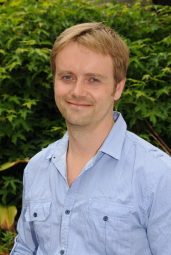Adam Hartland

2016: Dr Adam Hartland, University of Waikato, Environmental Research Institute, has been awarded a Rutherford Discovery Fellowship for research entitled: 'Unlocking the karst record: quantitative proxies of past climates from speleothems'.
Biography
Dr Adam Hartland is a geochemist specialising in the interaction between natural nanoparticles and trace elements in soil, water and minerals. His overall goal is to understand the role of these chemical processes in controlling trace element signatures in cave carbonates, thus allowing him to develop quantitative proxies of past climate. Adam has a long-held interest in the subsurface which he traces back to an undergraduate project studying groundwater food-webs under New Zealand’s Canterbury plains. He completed a PhD in speleothem science with Professor Ian Fairchild at the University of Birmingham, and a postdoctoral fellowship in groundwater geochemistry at the University of New South Wales. Adam is currently a Senior Lecturer at the University of Waikato and leads the Waikato Environmental Geochemistry Group (www.wegeochem.com).
Research summary
The reconstruction of climate variations through earlier geological periods (so called ‘palaeoclimate records’) is vital for assessing ongoing climate change and societal vulnerability with regard to both extreme events, and the long-term climate reorganization associated with greenhouse gas emissions.
Built up over thousands of years, crystal deposits (also called speleothems) in caves, such as stalactites and stalagmites, provide rich archives of climatic events. This information is stored in ‘isotopic records’ and other low-abundance ‘trace’ components captured during crystal formation. Isotope ratios express small variations in the abundance of heavy (rare) to light (common) forms of chemical elements. Speleothems provide some of the best terrestrial archives of past environmental conditions, yet the existing state of knowledge remains hampered by the complexity of speleothem isotopic records. Consequently, stable isotope-based paleoclimate reconstructions from speleothems remain essentially qualitative. To fully take advantage of these records, it is necessary to develop and improve methods to extract and calibrate isotopic records of past climates.
In this project, Dr Hartland will develop new chemical and physical environmental proxies to study changes in the important climate parameters of rainfall and temperature. These proxies will allow the forcing factors that influence traditional but ambiguous tracers to be distinguished from each other, and quantitative climate reconstructions to be developed. The project combines geochemical, magnetic and statistical approaches, allowing the proxies to be verified quickly and enabling swift development of quantitative models. In particular, the Rutherford Discovery Fellowship will enable him to develop a new proxy of drip-point discharge based on trace metals transported by dissolved organic matter, which will underpin the separation of climatic drivers in isotope records. These novel proxies will be tested using Australasian speleothems, producing new and detailed records of the El Niño–Southern Oscillation and the Southern Annular Mode over the last 10,000 years, thereby expanding our understanding of Southern Hemisphere climate systems.
